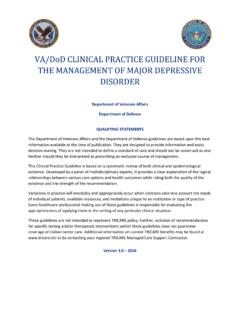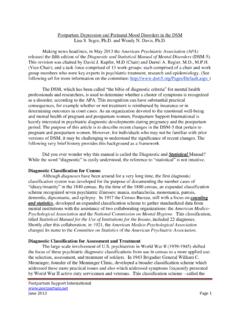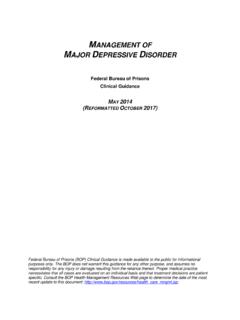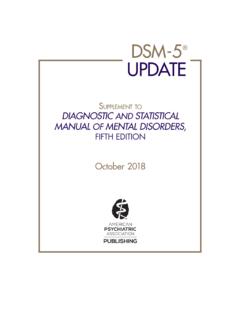Transcription of MAJOR DEPRESSIVE DISORDER: TREATMENT PLAN
1 1. Primary Care Neurology Psychiatry Integrated Health Care MAJOR DEPRESSIVE DISORDER: TREATMENT PLAN. General Information Depression is a common medical illness that affects one in five people at some point in their lifetime. Common symptoms associated with depression include: Sadness; depressed mood Hopelessness Loss of pleasure in most activities Low energy; fatigue Sleep disturbances Appetite disturbances Poor concentration and diminished ability to manage daily tasks In more serious cases, depression can be associated with: Suicidal thoughts or urges Self-injury Inability to manage the activities of daily living Unusual thoughts Depression can result in significant impairment in areas such as: Work productivity Academic performance Relationship skills Problem solving skills Depression is often associated with other disorders.
2 When these illnesses co-exist, outcomes can be negatively impacted unless both or all disorders are diagnosed and treated. Common co-existing illnesses include: Anxiety Disorders Substance Use Disorders Diabetes Cardiovascular Diseases Parkinson's Disease Autoimmune Disorders Chronic Pain 2. Primary Care Neurology Psychiatry Integrated Health Care TREATMENT of Depression Depression is a medical illness that affects brain and body. The illness of depression can have negative health consequences if not properly treated. It is important for patients to get all or almost all DEPRESSIVE symptoms under control as quickly as possible. Achieving only partial improvement is associated with a higher incident of relapse, poorer quality of life, and adverse health outcomes.
3 Most patients will need a comprehensive TREATMENT plan to achieve remission (the resolution of all or most symptoms) of their DEPRESSIVE episode . It is important to address all the causes that can contribute to depression including the brain and biological factors, stress-related contributors, co- existing medical illnesses, problem-solving and relationship skills, social supports, and lifestyle (including diet and exercise). Brain &. Biological Factors Stress-Related Lifestyle Contributors Comprehensive TREATMENT Plan Co-Existing Social Medical Supports Illnesses Problem- Solving &. Relationship Skills SMART centers strongly promote the implementation and active monitoring of a comprehensive care plan, as we believe this will give you the best chance to achieve the maximum benefit.
4 This means that for you to get the best results, you may need to combine therapy and medications, and in drug-resistant cases, include TMS therapy. For many patients, depression is a recurring, or at times, chronic condition. You may need a plan of ongoing TREATMENT to maintain improvement and prevent recurrence. TMS therapy booster treatments or additional courses of therapy are options for patients who have seen improvement from these treatments in the past. The following material provides a better picture of the interventions and suggestions will likely be a part of your care plan. 3. Primary Care Neurology Psychiatry Integrated Health Care What to Expect: Your TREATMENT Experience At SMART centers, your provider will rely on current medical evidence when establishing a TREATMENT plan for you.
5 Depending on your history (number of previous episodes and medication trials) and your symptoms and testing results, you and your provider will discuss all the options available that will best support your recovery. Below is a general guide to the care plan, as well as additional details about each intervention. Ongoing Symptoms or Persistent or Worsening Mild to Moderate Symptoms Moderate to Severe Symptoms Symptons Continue Diet, Exercise, Alternative Antipressant Trial Therapy Health-Promoting Activities or Additional Medications Diet, Exercise, Health- Add Antidepressant Add TMS to Medications Promoting Activities Medication(s) Anytime After One Failed Trial For a small percentage of patients, the options above may not provide adequate relief.
6 When this occurs, other TREATMENT options are available including hospital care and Electroconvulsive Therapy (ECT). ECT can be a powerful TREATMENT option for very severely depressed patients and is administered in a medical setting under general anesthesia. Assessment Depression is a brain disease that unfortunately does not currently have any standard biologic tests, such as blood testing or imaging of the involved organ, that are commonly used in other diseases, to diagnose the presence of the illness, or measure the health effects it is having on an individual. Because of this, SMART Health & Wellness Centers have developed a comprehensive approach to better evaluate our patients. Using a combination of comprehensive psychiatric exams and any of a number of screenings measurement-based testing, lab results looking for possible inflammatory conditions or chemical influences, genetic testing, and overall general health status monitoring our providers can develop a course of TREATMENT and create a personalized plan just for you.
7 Developing the right TREATMENT plan for you starts with a better understanding of your symptoms and arriving at the accurate diagnosis. This process starts with your psychiatric interview which helps your provider learn about you, including the course of your illness, the symptoms you experience, the stresses in your life, your past medical and psychiatric history, your current life situation, and your concerns and questions. 4. Primary Care Neurology Psychiatry Integrated Health Care Innovative Testing CNS Vital Signs Testing: A computerized neurocognitive testing platform that assesses how well your brain is managing tasks, such as working memory, verbal memory, concentration, processing speed, and executive functioning. These results give your provider objective measurements and can identify levels of impairment, or may track improvement in function.
8 This test can also be helpful in monitoring your progress during TREATMENT . qEEG: Quantitative electroencephalogram (qEEG) measures the electrical activity in the brain using surface electrodes. Data is collected and analyzed by a computer program and compared to databases that have established norms. The computer produces a colorized map demonstrating brain areas with low or excessive activity compared to these norms. This gives your provider objective information about which area(s) in the brain may be affected by, or may be generating, the dysfunction. This information may help explain your symptoms. While qEEG is not diagnostic by itself, by using this objective data and analyzing it within the clinical context of your symptoms, your provider may gain a better understanding of the location within your brain that may be causing your symptoms.
9 This data may be helpful to your provider in making decisions about additional testing or TMS therapy prescriptions. It may even suggest ruling out other co-existing psychiatric disorders. Genetic Testing: If you have failed to achieve remission after three antidepressant trials, or you have been intolerant of previous medications, your provider will recommend genetic testing to identify those medications which you should avoid because your body has shown it cannot properly metabolize the drug. Standard Testing Physical & Lab Work: If you have not had a physical exam or lab work within the last year, you will be encouraged to do both. Many physical illnesses masquerade as depression or worsen existing depression and must be addressed.
10 Thyroid disease, diabetes, neurological diseases, rheumatoid arthritis, and Lupus are just a few. Additionally, your provider will want to capture a general health baseline in order to appropriately monitor the impact of any prescribed medications on your overall health. 5. Primary Care Neurology Psychiatry Integrated Health Care TREATMENT Options Below is a general overview of TREATMENT options. You may have already tried some of these interventions or this may be your first experience with TREATMENT . Your provider will work with you to determine which TREATMENT is best for you at this time. Many individuals will progress through several options or may need a combination of interventions to achieve the best result. It will be important for you to communicate with your provider as you go through a comprehensive TREATMENT plan.






